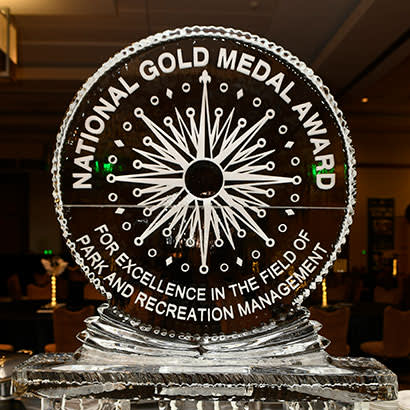
Applications are now being accepted for the 2019 Gold Medal Awards, the Oscars for parks and recreation. The online application consists of 25 questions, which all applicants must complete by the March 29 deadline.
In Parks and Recreation, we’ve often highlighted the benefits of, and provided tips on, applying for this award (for example, see the January 2018 article, “The National Gold Medal Award,” by Merry Moiseichik, a University of Arkansas professor, and Carolyn McKnight, the current American Academy for Park and Recreation Administration (AAPRA) president). This year, we reached out to Jodie Adams, chair of the Gold Medal Committee, and Susie Kuruvilla, the committee’s head judge, to get answers to some of the most frequently asked questions about the application process, such as:
Q: What is the most common error you see on applications?
A: A common error is not providing the number of examples specifically requested in the question. Some other mistakes are using the same example multiple times and not highlighting what is unique and special about the services and facilities. Judges are looking for quantifiable information and descriptive narratives, and using different examples gives them a broader picture of the agency. Agencies need to tell the overall story in narrative, while also providing enough details and data.
Q: If you’ve applied before, is it acceptable to recycle previously submitted answers?
A: If the answers are still relevant, then yes; however, it is always important to re-evaluate and make changes based on new and different elements from year to year.
Q: How are judges chosen?
A: A committee under oversight of the AAPRA selects five judges: four permanent-term judges and one guest judge. Judges are carefully selected to ensure they are individuals with a high level of integrity and can be objective.
Q: What’s the difference between public support and citizen involvement?
A: Public support shows how the agency is benefiting from the support of the public; i.e., passage of a referendum, public support of a project, etc. Citizen involvement is how residents of the district are engaged/volunteering with the operations of the agency on an ongoing basis.
Can you give an example of social equity for question 21 (In what ways has your agency addressed the NRPA Pillar of Social Equity in the last three years?)
Agencies can address their role in various aspects of social equity in their community; for example, engagement with those who have special needs, cultural diversity, socioeconomics, age diversity, etc.
Q: When asked about innovative or creative projects, are the judges basing this on the individual agency’s innovation or against what other agencies are doing?
A: Judges are basing the scores on how creative and innovative the project sounds from its description. It is important to demonstrate how the project or initiative is improving the systems or services of the agency in a new, unique way.
Q: Can we reference future planned projects/initiatives? Does planning need to be “in progress” at the time of submission?
A: Future planned projects/initiatives can be referenced, as long as they are in progress or are ready to begin.
Additional information to help you complete the application is available at www.nrpa.org/goldmedal.
The Gold Medal Committee and judges thank all the agencies, state parks and military bases that have applied for the award over the years. They are continually looking for ways to improve the application process and create public awareness for the esteemed Gold Medal Award. Please contact them with questions/comments at any time during the year at goldmedal@nrpa.org.

